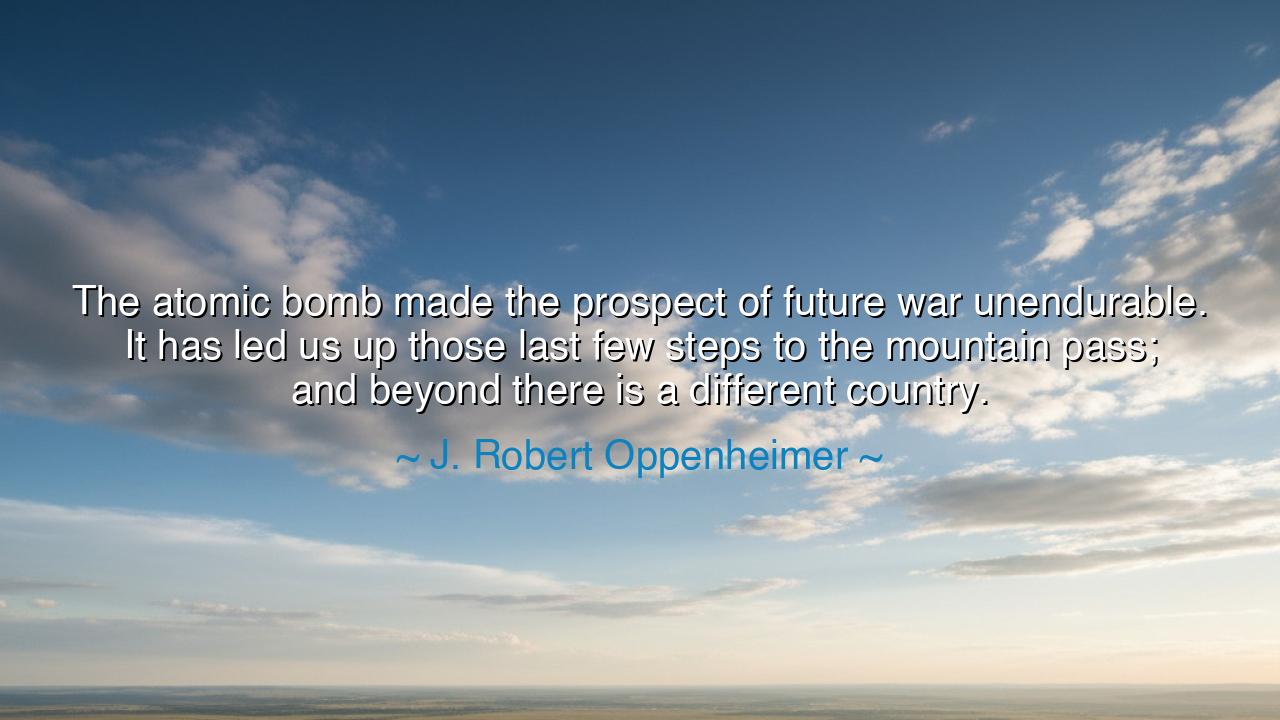
The atomic bomb made the prospect of future war unendurable. It
The atomic bomb made the prospect of future war unendurable. It has led us up those last few steps to the mountain pass; and beyond there is a different country.






"The atomic bomb made the prospect of future war unendurable. It has led us up those last few steps to the mountain pass; and beyond there is a different country." These words spoken by J. Robert Oppenheimer carry the heavy weight of history, marking a moment when the nature of warfare and the very future of humanity were irrevocably altered. In these words, Oppenheimer reflects on the profound change that the atomic bomb brought to the world, a force so powerful and destructive that it has reshaped our understanding of conflict, peace, and the very meaning of survival. The bomb was not just a weapon; it was a threshold, leading us from one reality into a new and uncharted realm.
In ancient times, there were moments of great change when the course of history was forever altered by a single event. The sword that slayed the mighty Goliath, the fall of Rome, the rise and fall of empires—each of these events marked the end of one world and the beginning of another. The atomic bomb, much like these pivotal moments, was such an event. It brought humanity to the brink of annihilation, where the future of war was no longer about battlefield heroics but about the unimaginable destruction that could be unleashed by a single strike. Oppenheimer's words evoke the deep sorrow and trepidation that came with the realization that the world had crossed a line that could not be uncrossed.
Oppenheimer, the father of the atomic bomb, understood better than anyone the power and danger that the weapon represented. The ancient sages often spoke of the double-edged sword, a tool that could either protect or destroy, depending on how it was wielded. The atomic bomb was that sword, capable of giving its possessor unimaginable power, but at the cost of a moral dilemma that humanity had never before faced. In the moments after its use on Hiroshima and Nagasaki, the world was forced to confront the reality that war had entered a new era, one where the possibility of total destruction was no longer theoretical, but immediate.
Consider the example of Alexander the Great, whose campaigns reshaped the known world. Though he sought to conquer and unite, his actions were ultimately constrained by the limitations of his time. The scales of destruction in his day were murderous, but they were not all-encompassing. The atomic bomb, however, broke through those constraints, offering a weapon so potent that it made any future war not just an inevitable part of human history, but an unbearable prospect. Where Alexander's armies could conquer lands and peoples, the atomic bomb had the potential to erase them entirely, leaving nothing but the echoes of devastation. Oppenheimer's words speak of this unendurable reality, the knowledge that humanity now stood on the precipice of its own undoing.
The mountain pass that Oppenheimer refers to is a metaphor for the critical moment in history when the world arrived at the edge of reason. In ancient stories, the mountain pass often represents a moment of transition, where heroes must decide whether to move forward into the unknown or retreat back into familiar, yet dangerous, territory. Once humanity crossed that threshold—once the atomic bomb was unleashed—the old rules of war no longer applied. The destruction of cities, the death of millions, became an eventual possibility, one that could no longer be ignored. We had ascended to the mountaintop, and there was no going back.
Beyond that pass, as Oppenheimer suggests, is a different country—a different world where the consequences of war are so vast, so incomprehensible, that the very idea of conflict must be viewed through a different lens. This new country is one where peace and diplomacy are not just idealistic notions but the very foundations of survival. The threat of annihilation has fundamentally altered the way we must think about war and peace, urging us to seek new ways of resolving conflict without resorting to violence. Oppenheimer’s words are a call for humanity to step into a new era, one where the stakes are no longer about conquest, but about ensuring the continuation of life itself.
The lesson to be drawn from Oppenheimer’s reflection is clear: with great power comes great responsibility. Just as the atomic bomb radically changed the nature of war, we must adapt to this new reality by embracing restraint, cooperation, and mutual understanding. We must recognize that the choices we make today, in our global society, have the potential to affect not only our own generation but all those who come after us. Oppenheimer’s somber reflection is a reminder that we cannot afford to think in the short term or cling to the old ways of thinking about power and conflict. We must now think long-term, considering the future not just of nations, but of humanity itself.
Let us take action by embracing the lessons of history and applying them to our own time. Peace must become our highest priority, and we must seek ways to build understanding and trust between nations. We stand on the precipice, having passed through the mountain pass. The world beyond is different, and we must tread carefully. We must remember that the power of the atomic bomb is a symbol of what humanity is capable of, for both creation and destruction. Let us choose to build a future where peace, rather than power, guides our way forward.






AAdministratorAdministrator
Welcome, honored guests. Please leave a comment, we will respond soon